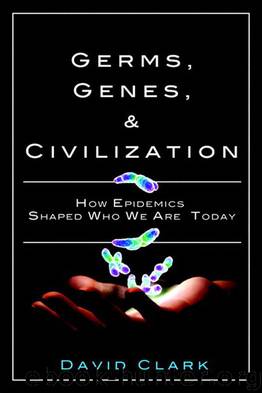Germs, Genes, & Civilization: How Epidemics Shaped Who We Are Today by David P. Clark

Author:David P. Clark [Clark, David P.]
Language: eng
Format: mobi, epub
Publisher: FT Press
Published: 2010-01-08T05:00:00+00:00
Germ warfare is unreliable
Perhaps one reason the major nations so readily agreed to outlaw germ warfare is that it is ineffective. In practice, bullets and bombs are easier to produce and handle than biological weapons. Another issue is that even the fastest diseases, such as pneumonic plague, take at least 24 hours to kill. And 24 hours is plenty of time for a retaliatory nuclear exchange. Another drawback is the problem of delivery. Spraying is the standard method of distributing germs. Unfortunately, this relies on the weather. First, a breeze is needed—and second, the wind must blow in the right direction!
During the 1950s, the British government field-tested harmless bacteria. When the wind blew the germs over “healthy” farmland, most airborne bacteria survived and landed alive and well. In contrast, when the bacteria were blown over industrial areas, especially oil refineries, the airborne bacteria were wiped out. Many airborne industrial pollutants are lethal to bacteria and viruses. Even if the wind is favorable, most of the population of an industrial nation is found in cities, protected from airborne germs by air pollution!
Download
Germs, Genes, & Civilization: How Epidemics Shaped Who We Are Today by David P. Clark.epub
This site does not store any files on its server. We only index and link to content provided by other sites. Please contact the content providers to delete copyright contents if any and email us, we'll remove relevant links or contents immediately.
| Administration & Medicine Economics | Allied Health Professions |
| Basic Sciences | Dentistry |
| History | Medical Informatics |
| Medicine | Nursing |
| Pharmacology | Psychology |
| Research | Veterinary Medicine |
Periodization Training for Sports by Tudor Bompa(8273)
Why We Sleep: Unlocking the Power of Sleep and Dreams by Matthew Walker(6725)
Paper Towns by Green John(5191)
The Immortal Life of Henrietta Lacks by Rebecca Skloot(4588)
The Sports Rules Book by Human Kinetics(4386)
Dynamic Alignment Through Imagery by Eric Franklin(4217)
ACSM's Complete Guide to Fitness & Health by ACSM(4060)
Kaplan MCAT Organic Chemistry Review: Created for MCAT 2015 (Kaplan Test Prep) by Kaplan(4012)
Livewired by David Eagleman(3774)
Introduction to Kinesiology by Shirl J. Hoffman(3772)
The Death of the Heart by Elizabeth Bowen(3622)
The River of Consciousness by Oliver Sacks(3604)
Alchemy and Alchemists by C. J. S. Thompson(3522)
Bad Pharma by Ben Goldacre(3428)
Descartes' Error by Antonio Damasio(3279)
The Emperor of All Maladies: A Biography of Cancer by Siddhartha Mukherjee(3163)
The Gene: An Intimate History by Siddhartha Mukherjee(3098)
The Fate of Rome: Climate, Disease, and the End of an Empire (The Princeton History of the Ancient World) by Kyle Harper(3067)
Kaplan MCAT Behavioral Sciences Review: Created for MCAT 2015 (Kaplan Test Prep) by Kaplan(2986)
